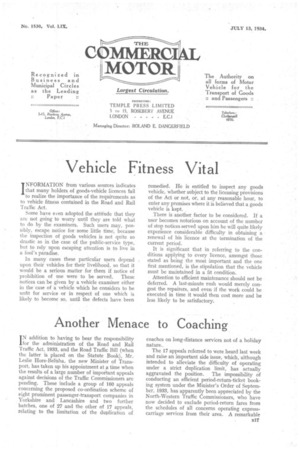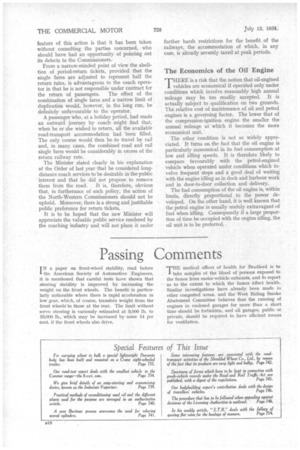Another Menace to Coaching I N addition to having to
Page 31

Page 32

If you've noticed an error in this article please click here to report it so we can fix it.
bear the responsibility for the administration of the Road and Rail Traffic Act, 1933, and the Road Traffic Bill (when the latter is placed on the Statute Book), Mr. Leslie Hore-Belisha, the new Minister of Transport, has taken up his appointment at a time when the results of a large number of important appeals against decisions of the Traffic Commissioners are pending. These include a group of 160 appeals concerning the proposed co-ordination scheme of eight prominent passenger-transport companies in Yorkshire and Lancashire and two further batches, one of 27 and the other of 17 appeals, relating to the limitation of the duplication of coaches on long-distance services not of a holiday nature..
The 17 appeals referred to were heard last week and raise an important side issue, which, although intended to alleviate the difficulty of operating under a strict duplication limit, has actually aggravated the position. The impossibility of conducting an efficient period-return-ticket booking system under the Minister's Order of September, 1933, has apparently been appreciated by the North-Western Traffic Commissioners, who have now decided to exclude period-return fares from the schedules of all concerns operating expresscarriage services from their area. A remarkable feature of this action is that it has been taken without consulting the 'parties concerned, who should have had an opportunity of pointing out its defects to the Commissioners.
From a narrow-minded point of view the abolition of period-return tickets, provided that the single fares are adjusted to represent half the return rates, is advantageous to the coach operator in that he is not responsible under contract for the return of passengers. The effect of the combination of single fares and a narrow limit of duplication would, however, in the long run, be definitely unfavourable to the operator.
A passenger who, at a holiday period, had made an outward journey by coach might find that, when he or she wished to return, all the available road-transport accommodation had been filled. The only course would then be to travel by rail and, in many cases, the combined road and rail single fares would be considerably in excess of the return railway rate.
The Minister stated clearly in his explanation of the Order of last year that he considered longdistance coach services to be desirable in the public interest and that he did not propose to remove them from the road. It is, therefore, obvious that, in furtherance of such policy, the action of the North-Western Commissioners should not be upheld. Moreover, there is a strong and justifiable public preference for return tickets.
It is to be hoped that the new Minister will appreciate the valuable public service rendered by the coaching industry and will not place it under further harsh restrictions for the benefit of the railways, the accommodation of which, in any case, is already severely taxed at peak periods.
The Economics of the Oil Engine
THERE is a risk that the notion that oil-engined 1 vehicles are economical if operated only under conditions which involve reasonably high annual mileage may be too readily accepted. It is actually subject to qualification on two grounds. The relative cost of maintenance of oil and petrol engines is a governing factor. The lower that of the compression-ignition engine the smaller the annual mileage at which it becomes the more economical unit.
The other condition is not so widely appreciated. It turns on the fact that the oil engine is particularly economical in its fuel consumption at low and idling speeds. It is therefore likely to compare favourably with the petrol-engined vehicle when operated under conditions which in yolve frequent stops and a good deal of waiting with the engine idling as in dock and harbour work and in door-to-door collection and delivery.
The fuel consumption of the oil engine is, within limits, directly proportional to the power developed. On the other hand, it is well known that the petrol engine is usually unduly extravagant of fuel when idling. Consequently if a large proportion of time be occupied with the engine idling, the oil unit is to be preferred. .




























































































